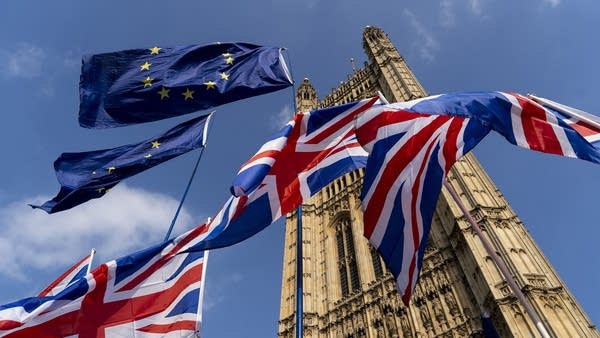UK’s cost-of-living crisis breathes new life into old battle over Brexit

With an inflation rate just over 9%, the United Kingdom is more or less in the same boat as the U.S. and the European Union. But the U.K.’s cost-of-living crisis is having one unique effect: stirring up the 6-year-old cold war over Brexit. Opponents of Britain’s departure from the EU say support for the idea of reversing Brexit can only grow.
“We see consistent polling at the moment showing a constant majority saying we should rejoin the EU,” Richard Hewison of the small Rejoin EU party told Marketplace. “I think things can only accelerate further in that direction.”
Hewison said that the pressure on British household budgets had been intensified by the sharp fall in the British pound following the vote for Brexit, which made imports into the U.K. more expensive. He said the remedy is obvious.
“Sterling would gain dramatically against other currencies if we were to rejoin the EU,” he said. “That of course would take a lot of pressure off the cost-of-living crisis as the inputs into the system would drop in price.”
But another keen EU supporter, professor Peter Holmes of the UK Trade Policy Observatory, pointed out that the opinion poll majorities in favor of rejoining are still too small to justify another referendum.
“There’s no polling evidence that rejoining is an option that any cautious politician would want to embrace,” Holmes said.
However, he certainly hasn’t given up hope of a return to the European fold.
“There are some intermediate steps that we can take towards eventually rejoining the EU,” he said.
Holmes has penned a paper suggesting a way of mitigating what he believes are the worst effects of the U.K.’s departure from the European Union: the hassle and higher costs British exporters and importers now face when dealing with the bloc.
He points to a provision in the Trade and Cooperation Agreement with the EU that allows for a five-yearly review that could enable the U.K. to harmonize its regulations with Brussels in specific areas to reduce the bureaucratic burdens imposed after Brexit. Holmes believes that bit by bit, the U.K. could edge its way back into closer economic proximity with its largest trading partner. That should please some rejoiners and could be palatable to some Brexiteers as well because it does not in the short term involve full integration.
But Brexit-supporting professor Patrick Minford of Cardiff Business School vigorously opposes any attempt to draw the U.K. back into the EU’s regulatory orbit.
“The whole basis of the Brexit vote was to get back to self-governance. That was really what Brexit was all about,“ Minford declared.
He also insisted that the cost-of-living crisis has nothing to do with Britain’s departure from the EU.
“It has all to do with COVID and how different economies responded to it,” he said. “The U.K. is actually well placed to curb inflation because it can scrap all the high tariffs that the protectionist EU imposes on imports from the rest of the world.”
While its inflation rate is not significantly worse than those of the U.S. or continental Europe, the U.K. does appear to be facing a sharper economic slowdown.
The Organization for Economic Cooperation and Development has forecast that the U.K. will have zero growth next year, the worst performance for a developed country. Rejoiners blame Brexit.
But the Brexiteers say, “Stay tuned. Another debt crisis is looming in the eurozone. We’re much better off outside the bloc.”










